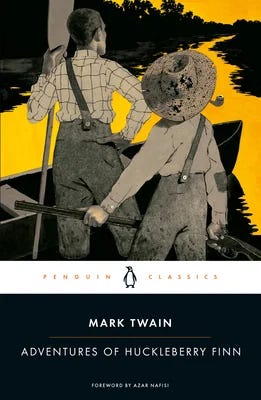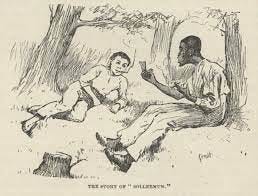Percival Everett’s James begins, “Those little bastards were hiding out there in the tall grass.” That would be Huck and Jim, hiding until they decide what kind of trick they wanted to play on him—“…villain or prey, but certainly their toy.” Jim narrates in standard English until he can sense the boys getting restless and thinks, “It always pays to give white folks what they want”.
He calls out, “who dat dere in da dark lak dat?”
The first surprise of Percival Everett’s retelling of Mark Twain’s The Adventures of Huckleberry Finn: the Black characters speak to each other in standard English, reverting to slave vernacular when White people are present.
Not long after, ghost trick, Miss Watson says, “‘Jim, I’m gonna ask you a question now. Have you been in Judge Thatcher’s library room?’
‘In his what?’
‘His library.’”
‘You mean dat room wif all dem books?’
‘No, missums. I seen dem books but I aint been in da room. Why fo you be askin’ me dat?’
‘Oh, he found some book off the shelves.’
I laughed. ‘What I gone do wif a book?’
She laughed, too.”
But Jim has the last laugh: he’s been reading Judge Thatcher’s books since he was a boy.
Nights, he gives language lessons to the children. He explains, “These were indispensable. Safe movement through the world depended on mastery of language, fluency.”
He tests them with “situational translations.” You see that a white person is on fire but she doesn’t know it. How should you tell her.
“‘Fire, fire,’ says one child.
‘Direct. And that’s almost correct.’
‘Lawdy, missum! Looky deere,’ suggests another.
‘Perfect,’ [Jim] says. ‘Why is that correct?’
‘Because we must let the whites be the ones who name the trouble.
‘And why is that?’ [he] asks.
‘Because they need to know everything before us. Because they need to name everything.’”
When one of the children asks, “Why did God set it up like this? With them as masters and us as slaves?” Jim responds, “There is no God, child. There’s religion but there’s no God of theirs. Their religion tells that we will get our reward in the end. However, it apparently doesn’t say anything about their punishment. But when we’re around them, we believe in God. Oh, Lawdy Lawd, we’s be believin’. Religion is just a controlling tool they empower and adhere to when convenient…the more you talk about God and Jesus and heaven and hell, the better they feel.”
“And the better they feel, the safer we are,” the child says.
Translated: “Da mo’betta dey feels, da mo’ safer we be.”
The switch in our perception of Twain’s story is exhilarating. The complete cluelessness of White folks in their presence, so satisfying.
But maybe a quarter of the way in, I wondered, Is this it? Huck’s story becomes Jim’s story with a switch in point of view, enhanced by the modification and language and literacy?
It was not!
Once Huck and Jim are on the river, they meet some of Twain’s characters and play out versions of those parts of the novel—Huck as a girl, the Shacklefords and Grangers, the Duke and Dauphin. But as Elliott introduces new characters, the original story bends in a whole new direction.
A stolen pencil with dire consequences; imagined conversations with Voltaire, Rousseau and Locke on “slavery, race and, of all things, albinism”. A situation in which Jim must perform blackface with a white minstrel troupe.
He asks Norman, a runaway slave who passes as white, “What is this whole thing?”
Norman says it’s “white folks painting themselves and making fun of us to entertain each other…They even do the cake walks.”
“But that’s how we make fun of them,” [Jim says].
“Yes, but they don’t get that—it’s lost on them. It’s never occurred to them that we might find them mockable.”
“Double irony,” [Jim says]. “That is amusing. Can one irony negate another, one cancel out the other?”
There’s a hidden notebook in which, a notebook in which, writing his life story, Jim becomes James.
This book is such a mix of rage, irony, and brilliant observation that I could hardly get my head around it. One minute, I’d marvel at how smart it was; the next, my heart would crack with grief at the terror and indignity of living as Jim lived. Sometimes the book was so funny I laughed out loud.
I wondered what Everett would do with the last third of The Adventures of Huckleberry Finn, which I, personally, find maddening. Twain had written so honestly about slavery up to where Huck is alone on the raft, agonizing over whether he should send a letter to Miss Watson telling her of Jim’s whereabouts.
“It was a close place. I took it up and held it in my hand. I was a trembling, because I’d got to decide, forever, betwixt two things, and I knowed it. I studied a minute, sort of holding my breath, and then says to myself: “All right, then, I’ll go to hell”—and tore it up. It was awful thoughts and awful words, but they was said. And I let them stay said; and never thought no more about reforming.”
At which point, Tom Sawyer appears and the plot becomes, in my view, ridiculous.
I used to teach The Adventures of Huckleberry Finn to sophomores every year, partly as the basis for teaching them how to answer an essay question. I wish I could remember the three-part question I constructed, making sure that the answers were very clear in the text, but I do remember the last part.
Using examples from the text, describe how how Huck felt about his decision to save Jim and go to hell for it.
“Tom knew in his heart of hearts that what he’d done was right,” most concluded
This was partly (and predictably), because they wrote from the top of their heads rather than going to the text. But it was way more interesting than that.
After I handed back the papers, some were angry at my comments, and we’d have the “I have the right to my opinion” discussion—well, argument. “Yes,” I’d say. “You do have a right to your opinion. But there’s a huge difference between an opinion, based on feelings, and an opinion, based on facts.
“Show me in the text where Huck indicates in any way that he believes his decision to save Jim was right,” I’d say.
They couldn’t. It wasn’t there.
Still, they could not let go of the belief that Huck knew he was right, some continued to argue for it—and, in time, I realized that they literally could not imagine Huck’s world. They understood that slavery was wrong, they understood that even now Black people suffered its aftermath, which was also wrong.
What they could not understand was a white person not knowing in their heart of hearts that Blacks were equal. They could not comprehend the fact that the White people in Huck’s world behaved based on the sincere belief that Blacks were of a completely different order of human being than they were. They could choose to be cruel, indifferent, or kind to their slaves; they could not change the fact that they were hard-wired to believe slaves were inferior.
Of course, there were White people then who believed otherwise, people who did their best to make change. Twain seems to have been one of them. Still, I wonder if it was hard-wired beliefs about Blacks and Whites that kept him from imagining a better ending for The Adventures of Huckleberry Finn.
Percival Everett created the ending it deserves.
For me, the best thing about James is the way it unfolds in ways I’d never have imagined toward its remarkable, believable, deeply satisfying conclusion.
I wish Mark Twain could read it.







Cannot wait to read this!! Thank you for this fantastic review!
THE TREES totally blew my mind!